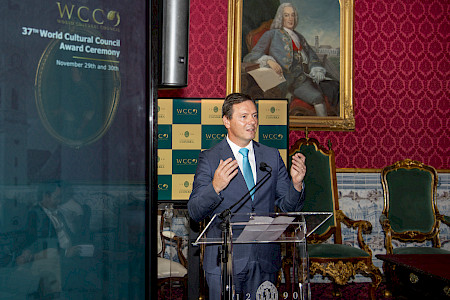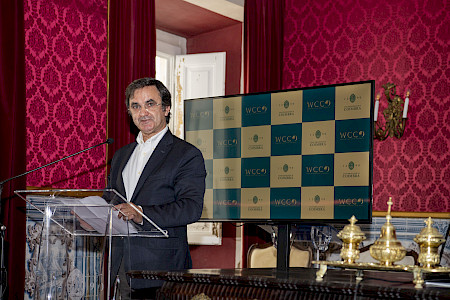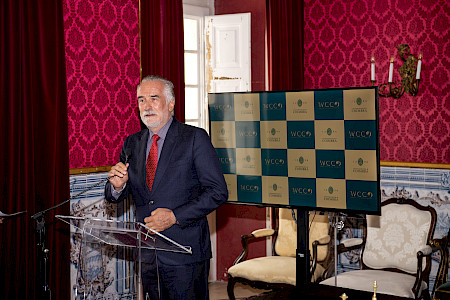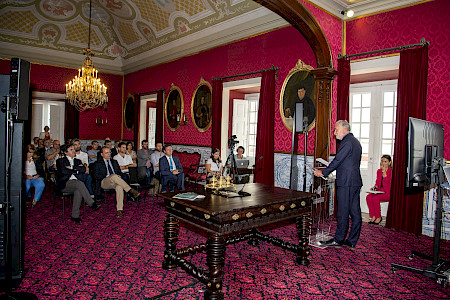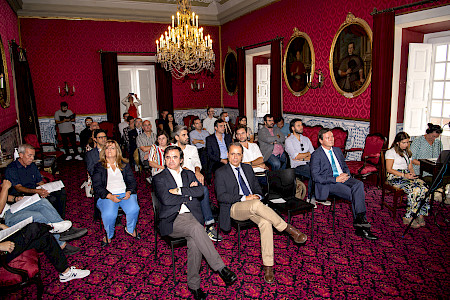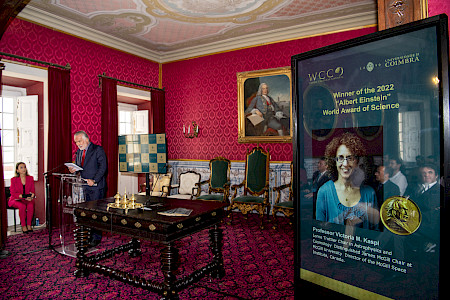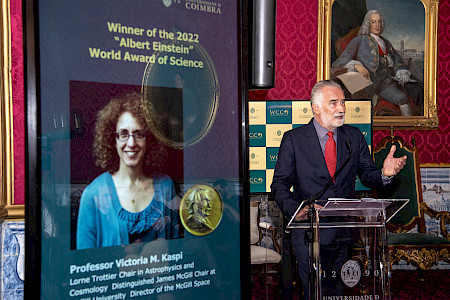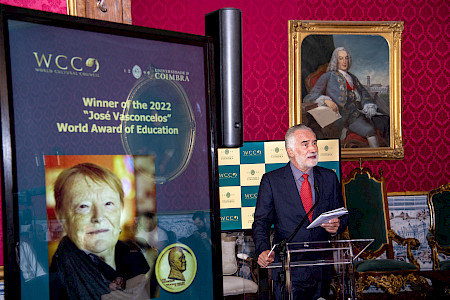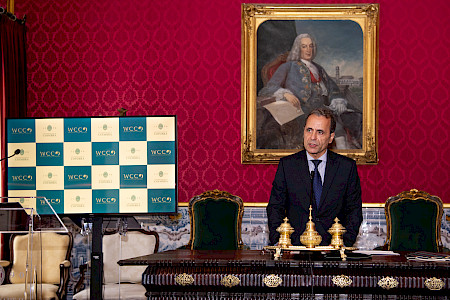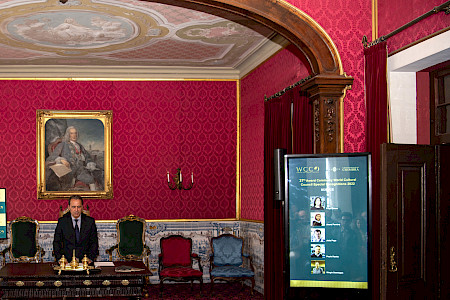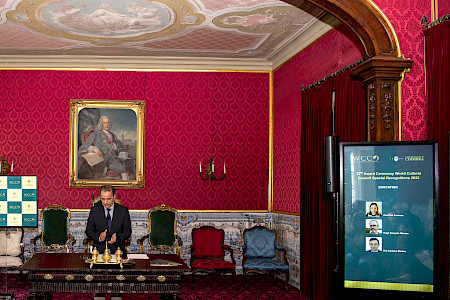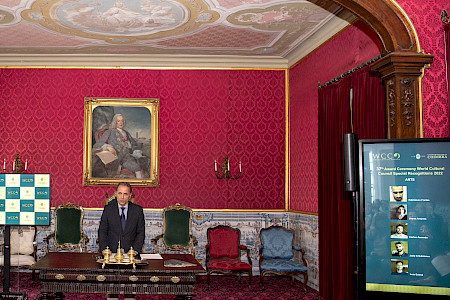Winners of the 2022 World Cultural Council awards already announced – Award Ceremony to be held in Portugal for the first time
For the first time, a Portuguese university will host the WCC ceremony where the prestigious Albert Einstein, José Vasconcelos and Leonardo da Vinci prizes will be awarded. The ceremony will take place on 30 November.
Left to right: UC Vice-Rector for culture and open science, Delfim Leão; Executive Director of the World Cultural Council, Esteban Meszaros; UC Rector, Amílcar Falcão; Deputy Mayor of Coimbra, Francisco Veiga
© UC | Paulo Amaral
English version: Diana Taborda
The winners of the 2022 World Cultural Council Awards were announced today.
The winner of the 2022 “Albert Einstein” World Award of Science is Professor Victoria M. Kaspi, Lorne Trottier Chair in Astrophysics and Cosmology, and Distinguished James McGill Chair at McGill University, and Director of the McGill Space Institute, Canada. She is a world leader in studies of neutron stars. Her research group has produced many of the most exciting results in this field and puts Canada at the cutting-edge of astrophysics.
The prize is awarded in recognition of her fundamental contributions to our understanding of the most extreme form of stars known in our universe: the “magnetars”, neutron stars having the highest magnetic fields known in the Universe. Her work connecting their X-ray flaring behaviour to their timing properties has been fundamental to understanding the cause of the flares and the key differences in the structure and evolution of the magnetospheres of magnetars compared to those of “ordinary” neutron stars.
The WCC acknowledges Professor Kaspi´s seminal and ground-breaking work involving dense stellar objects. Her work has had a major impact on astronomy, especially regarding the physics of neutron stars: which is an important piece to understanding the content of our universe.
"I am truly surprised and deeply honoured to be recognized for so prestigious a prize from the World Cultural Council," said Professor Kaspi. "I am particularly thrilled and proud to be recognized for mentorship of students and postdocs—the next generation of scientists. It is among the most rewarding and fun aspects of my job."
The 2022 “José Vasconcelos” World Award of Education will be granted to Professor Claudia Mitchell, Distinguished James McGill Professor in the Faculty of Education of McGill University in Canada.
"I am so honoured to receive this prestigious award and its recognition of the significance of the participation of young people, especially girls as young women, as central to social change," said Professor Mitchell. "I would like to acknowledge the creativity of my amazing doctoral students in the Participatory Cultures Lab at McGill University, along with the support of colleagues in the Faculty of Education. I continue to be inspired by my exceptional colleagues at the Centre for Visual Methodologies at the University of the KwaZulu-Natal and their commitment to engaging rural communities."
The prize is awarded for her life commitment to education as an inspiring teacher and passionate advocate for youth, especially transforming lives of thousands of young people, from marginalized backgrounds. Professor Mitchell´s work and passion mirror the dedication of José Vasconcelos whose life work was to bring education to those most disadvantaged.
The Jury especially appreciated Professor Mitchell´s pledge for tackling difficult social issues which has had a profound, lasting impact on the wellbeing and self-esteem of girls in many nations and for her remarkable capability to run innovative and adaptive projects and to do academic teaching and research.
"These awards are an amazing validation of the dedication, creativity, and tenacity of two of McGill's most accomplished researchers," said Martha Crago, Vice-Principal, Research and Innovation. "Professor Kaspi has fundamentally advanced our understanding of neutron stars and stellar objects. Professor Mitchell has made a difference in the lives of many girls and women through her commitment to community-driven scholarship. I could not be prouder of their accomplishments."
Architect and educator J. Meejin Yoon, the Gale and Ira Drukier Dean of the College of Architecture, Art, and Planning at Cornell University, USA, has been selected as the winner of the 2022 "Leonardo da Vinci" World Award of Arts.
Members of the World Cultural Council recognized Yoon as an extraordinary leader in design practice, research, and education, particularly for her commitment to social justice and equity, environmental sustainability, and technological innovation deployed for the betterment of society.
On receiving the 2022 "Leonardo da Vinci" World Award of Arts, Yoon said, "It is a true honour to join a long line of artists, architects, writers, musicians, and others who share a belief in the power of creativity and imagination, and the potential for art in all its forms to inspire and build a better world now and well into the future."
The "Leonardo da Vinci" World Award of Arts prize is granted for Yoon's leadership roles in higher education, achievements in academia, and for her unique contribution to the architecture discipline. In particular, the jury recognizes Yoon's innovative and thoughtful design of public memorials, installations, and structures, which are informed by a profound sense of historical and cultural context as well as the need to inspire and bring communities together by providing places of remembrance and reflection that inspire hope.
"In my capacity as President of the World Cultural Council, I am delighted to learn about the three outstanding individuals that our jury has selected for this year's WCC awards. Each winner, in their own discipline, has made remarkable contributions to knowledge and culture. Their outstanding accomplishments embody service to humankind which is an important element of our awards. I congratulate them as well as the special recognition recipients. I wish the three WCC award winners and the 13 promising young research leaders success as they pursue their research with renewed passion going forward into the future," stated Sir Fraser Stoddart, President of the World Cultural Council.
The 37th Award Ceremony will be hosted by the University of Coimbra, Portugal, to be held on November 30, 2022. This will be the first time in the history of the WCC awards programme that all three prizes will be presented at the same event.
On this occasion the Award Ceremony will coincide with the 250th anniversary of the Pombaline Reforms, which opened UC to scientific and experimental teaching and the ideals of the Enlightenment.
As part of the programme, the WCC, in cooperation with the University of Coimbra, organizes laureate lectures that create an opportunity for interaction between the community and the winners. These lectures will take place on November 29, 2022.
During the Award Ceremony, the World Cultural Council will grant special acknowledgements to young researchers or scholars from Portugal who have achieved outstanding performance in science, education and the arts.
The thirteen promising young research leaders are: Ana Filipa Silvia Bessa, Assistant Researcher, MARE – Marine and Environmental Sciences Centre, University of Coimbra; Joana Ferreira, Assistant Researcher, Center for Neuroscience and Cell Biology – CNC, University of Coimbra; João Peça, Assistant Professor of Molecular and Cell Biology, University of Coimbra; Paulo Rocha, Associate Professor, Department of Life Sciences, University of Coimbra; Sérgio Domingos, Assistant Researcher, CFisUC, Centre for Physics, Department of Physics, University of Coimbra; Ana Dias Fonseca, Post-doctoral researcher at Faculty of Psychology and Educational Sciences, University of Coimbra; Hugo Ricardo Gonçalo Oliveira, Assistant Professor, Department of Informatics, Engineering, Faculty of Sciences and Technology, University of Coimbra; Rui Cardoso Martins, Assistant Professor in the Department of Chemical Engineering, University of Coimbra; Edicleison Freitas, Visual Artist, Arts College, University of Coimbra; Joana Antunes, Faculty of Letters, Art Historian, University of Coimbra; Carlos Azevedo, co-founder of depA Architects, João Crisóstomo, depA Architects and collaborator at the Department of Architecture at Coimbra University; Luís Sobral, depA Architects and collaborator at the Department of Architecture at Coimbra University. They will each receive a Commemorative Diploma for their impressive work at such an early stage of their careers.
Watch the announcement of the winners and the full programme of the 37th World Cultural Council Award Ceremony here.
About the Awards
The awards were established by the Council to acknowledge individuals or institutions that have made outstanding achievements in science, education and the arts:
The “Albert Einstein” World Award of Science is a recognition, as well as an incentive to scientific and technological research and development that takes into special consideration those researchers which have brought true benefit and well-being to mankind. Its recipient is elected by an Interdisciplinary Committee, constituted by world renowned scientists.
The “José Vasconcelos” World Award of Education was established as an acknowledgement to those who have the all-important task of teaching as a foundational element of our present civilization. It is granted to a renowned educator, an authority in the field, or a legislator of education policies who has had a significant influence on the advancement in the scope of culture for mankind.
The “Leonardo da Vinci” World Award of Arts is an acknowledgement to those who lift our existence to a higher level by the beauty or inspiration of their creative talent. It is conferred on a renowned artist, sculptor, writer, poet, cinematographer, photographer, architect, musician or other performing, creative or visionary artist, whose work constitutes a significant contribution to the artistic legacy of the world.
A Commemorative Medal, a diploma, and an award cheque, as well as international recognition from the scientific, educational and arts communities, are the rewards of the World Awards.
Through its work, the World Cultural Council spotlights research, pioneering work in education and artistic expressions that bring progress to mankind and foster the advancement of culture, while underscoring excellence as a guiding principle in science, innovation and education. It also aspires to build bridges with and between leading institutions around the world. The prizes additionally commend the qualities inspired by the awardees as role models, encouraging future generations to contribute to a better world.
For further information on the event please visit: https://wcc.uc.pt

